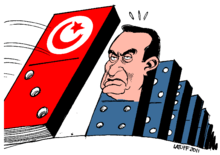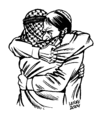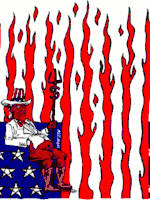Carlos Latuff
| Carlos Latuff | |
|---|---|
|
Carlos Latuff in 2012 | |
| Born |
Carlos Latuff November 30, 1968 Rio de Janeiro, Brazil |
| Nationality | Brazilian |
| Known for | Political cartoons, Social commentary |
| Movement | Anti-globalization, anti-capitalism, anti-imperialism, anti-racism, anti-fascism, anti-Zionism, Marxism, socialism, feminism, indigenous rights |
Carlos Latuff (born November 30, 1968) is a Brazilian freelance political cartoonist.[1] His works deal with an array of themes, including anti-Zionism, anti-globalization, anti-capitalism, and anti-U.S. military intervention. He is best known for his images depicting the Israeli–Palestinian conflict and the Arab Spring events.
Some of Latuff's cartoons comparing Israel to Nazism have been accused of being antisemitic by the Simon Wiesenthal Center and some authors.[2][3][4] Latuff has dismissed the charges of antisemitism as "a strategy for discrediting criticism of Israel."[5] while book reviewer Eddie Portnoy in The Forward has stated that while his message is "furiously critical" of Israel, it is not anti-Semitic.
Early life
Latuff was born in the neighborhood of São Cristóvão in Rio de Janeiro, Brazil,[6] and is of Lebanese ancestry; in his own words he has "Arab roots".[1]
History
Latuff started as a cartoonist for leftist publications in Brazil. After watching a 1997 documentary about the Zapatistas in Mexico, he sent a couple of cartoons to them, which received a positive response. He stated that after this experience, he decided to start a website and engage in "artistic activism". Graham Fowell, ex-chairman of the Cartoonists' Club of Great Britain, compares his work to Banksy, an English-based graffiti artist, political activist and film director.
Latuff has been arrested three times in Brazil for his cartoons about the Brazilian police, in which he criticized police brutality.[7]
In 2011, Latuff was contacted by activists in Egypt. Latuff stated that he was encouraged when he saw some of his cartoons depicted in the January 25 Egyptian protests, a couple of days after he made them. According to Reuters, this helped him become "a hero of the tumultuous Arab Spring with rapid-fire satirical sketches".[8]
Published works
Latuff's works have been posted mostly by himself on Indymedia websites and private blogs. However, some of them have been picked up and featured in magazines such as the Brazilian edition of Mad,[9] Le Monde Diplomatique[10] and The Toronto Star.[11] In addition, a few of his works were published on Arab websites and publications such as the Islamic Front for the Iraqi Resistance (JAMI) magazine, the Saudi magazine Character, the Lebanese newspaper Al Akhbar, among others.[12] Additionally, Latuff also contributes to several Middle Eastern newspapers, including Alquds Alarabi, Huna Sotak and the Islamophobia Research and Documentation Project - IRDP.[13]
Themes


A vast number of Latuff's cartoons are related to the Israeli-Palestinian conflict, which according to Latuff : "became important to Latuff after he visited the area in the late 1990s."[14] These cartoons are heavily critical of Israel[14] and have drawn criticism and allegations of uninhibited utilization of "judeophobic stereotypes in the service of the anti-globalisation movement."[15]
In his We are all Palestinians (Arabic: كلنا فلسطينيون) cartoon series, various famous oppressed groups, including Jews in the Warsaw Ghetto, Black South Africans during Apartheid, Native Americans, and Tibetans in China, are all shown stating "I am Palestinian."[16]
Latuff has also made a series of cartoons that portray Israeli Prime Minister Ariel Sharon,[17][18][19] United States President George W. Bush, Brazilian president Luiz Inácio Lula da Silva and British PM Tony Blair among other politicians as monsters and as Nazis.[20][21][22][23][24][25][26]
Latuff is also critical of US military action in Iraq and Afghanistan. He started publishing his work on the web as soon as the invasion started. According to his narrative, "war is not a video game, and technofetishism is not to be celebrated, but exposed."[27] He has made promotional cartoons for anti-US militancy as well as cartoons alleging US actions have been motivated by the chance of making profit from oil. Among the cartoons, there are also some that portray US soldiers as severely wounded, dead, or paraplegic or as harming Iraqi civilians.
In his comic series Tales of Iraq War (Arabic: حكايات من حرب العراق) he portrays "Juba, the Baghdad sniper",[28][29][30] an Iraqi insurgency character claimed to have shot down several dozen US soldiers, as a "superhero".[31] He has also made a caricature of US President George W. Bush laughing over US casualties.[32]
Since the end of 2010, he has been consistently engaged in producing cartoons about the Arab Spring in which he openly sided with the revolutionaries. After the victory of revolutions in Tunisia, Egypt and Libya his cartoons about these countries have focused on the menace of counter-revolution or Western interference. Some of his cartoons have been displayed in mass demonstrations in Arab countries.[8][33][34]
Allegations of antisemitism




The notability of Latuff and his cartoons has drawn criticism from individuals and organizations, especially in the form of accusations of antisemitism.
His works were criticized by a writer for the Institute for Global Jewish Affairs, part of the Jerusalem Center for Public Affairs (an Israeli NGO), for allegedly containing antisemitism and antisemitic motifs.[2]
In 2002 the Swiss-based Holocaust survivors organization Aktion Kinder des Holocaust sued the Indymedia of Switzerland on the charge of antisemitism for publishing Latuff's cartoon titled We are all Palestinians series in their website, which depicted a Jewish boy in the Warsaw Ghetto saying: "I am Palestinian."[3][36][37] The criminal proceedings were suspended by Swiss court.[38]
In their 2003 Annual Report, the Stephen Roth Institute compared Latuff's cartoons of Ariel Sharon to "the antisemitic caricatures of Philipp Rupprecht in Julius Streicher's Der Stürmer."[39] The SRI also complained over a cartoon showing Argentinian revolutionary Che Guevara in a Palestinian keffiyeh.[40]
In 2006, Latuff placed second for his cartoon comparing the West Bank barrier with the Nazi concentration camps, in the Iranian 'International Holocaust Cartoon Competition'.[4][41] Latuff's entry was described as "Holocaust inversion," a "motif" of antisemitism, by Manfred Gerstenfeld.[42]
Joel Kotek, a professor at Belgium’s Free University of Brussels, in his book Cartoons and Extremism[43] calls Latuff “the contemporary Drumont of the internet.” Eddy Portnoy, in The Jewish Daily Forward, reviewing the book, writes that Latuff material is "often terribly obnoxious... but it is a stretch to categorize his cartoons as antisemitic, and it is a disservice to the fight against genuine antisemitism to have included [the Latuff cartoons]".[44]
Latuff's response
In an interview with the Jewish-American weekly newspaper The Forward in December 2008, Latuff responded to charges of antisemitism and the comparisons made between his cartoons and those published in Der Stürmer in Nazi Germany:
My cartoons have no focus on the Jews or on Judaism. My focus is Israel as a political entity, as a government, their armed forces being a satellite of U.S. interests in the Middle East, and especially Israeli policies toward the Palestinians. It happens to be Israeli Jews that are the oppressors of Palestinians... My detractors say that the use of the Magen David in my Israel-related cartoons is irrefutable proof of antisemitism; however, it’s not my fault if Israel chose sacred religious motifs as national symbols, such as the Knesset Menorah or the Star of David in killing-machines like F-16 jets.[5]
Latuff also stated that anti-Semitism is real, that anti-Semites like European neo-Nazis, "hijack" the Palestinian cause to bash Israel. To assert, however, that anti-Zionism is anti-Semitic is, in his view, "a well-known tactic of intellectual dishonesty." He said that political cartoonists work by metaphors, and that similarities can be found between the IDF treatment of Palestinians and what Jews experienced under the Nazis. Such comparisons are not created by cartoonists, he added, but are made worldwide. He instanced the fact that a Holocaust survivor like Tommy Lapid reacted to the image of a Palestinian woman foraging in the rubble by thinking of his grandmother who died in Auschwitz. The use of cartoons insulting Muslims by depicting Muhammad as a bomber is defended as "freedom of speech", while using the Holocaust in drawings is deplored as "hatred against the Jews".[5]
Latuff was included in Simon Wiesenthal Center's 2012 Top Ten Anti-Israel/Anti-Semitic Slurs list,[45] which he considered "a joke worthy of a Woody Allen movie". He also claimed that Zionist lobbying groups try to associate him with well-known extremists and racists in order to disqualify his criticism of the Israeli government. According to him, "criticism or even attacks to the polity known as Israel do not mean hatred towards Jews because the Israeli government does not represent the Jewish people just as no government represents the totality of its people". He also pointed out that figures such as José Saramago, Desmond Tutu and Jimmy Carter were also accused of being antisemitic, saying that he was "in good company".[46]
Gallery
 Latuff comparing Gaza with a Nazi Ghetto and Israeli soldiers as SS soldiers
Latuff comparing Gaza with a Nazi Ghetto and Israeli soldiers as SS soldiers "GazaGhetto" compares Israeli soldiers with Nazi troops during the Warsaw Ghetto Uprising
"GazaGhetto" compares Israeli soldiers with Nazi troops during the Warsaw Ghetto Uprising Creation of a suicide bomber
Creation of a suicide bomber Latuff's cartoons are often used in protests. This demonstration was against Folha de S.Paulo's usage of the term "ditabranda" to describe the Brazilian military dictatorship (1964–1985)
Latuff's cartoons are often used in protests. This demonstration was against Folha de S.Paulo's usage of the term "ditabranda" to describe the Brazilian military dictatorship (1964–1985) 'Global Intifada' by Latuff shows a 'global persona' wearing a Keffiyeh, making the V (victory) sign with the left hand and holding a slingshot in the right hand, in front the Palestinian flag
'Global Intifada' by Latuff shows a 'global persona' wearing a Keffiyeh, making the V (victory) sign with the left hand and holding a slingshot in the right hand, in front the Palestinian flag Tribute to White Power
Tribute to White Power 'Uncle Sam wants you DEAD!' by Latuff shows Adolf Hitler with Uncle Sam's top-hat (representing the United States) and a Nazi swastika atop it
'Uncle Sam wants you DEAD!' by Latuff shows Adolf Hitler with Uncle Sam's top-hat (representing the United States) and a Nazi swastika atop it 'Just following orders' by Carlos Latuff shows Nazi SS members compared to Israeli soldiers described as "born to kill". Text in the shape of a Nazi swastika says: "Israeli soldiers are just following orders"
'Just following orders' by Carlos Latuff shows Nazi SS members compared to Israeli soldiers described as "born to kill". Text in the shape of a Nazi swastika says: "Israeli soldiers are just following orders"

 Israeli Palestinian sides
Israeli Palestinian sides Picture "forgiveness", depicts the reconcilement of a Jew and an Arab Palestinian.
Picture "forgiveness", depicts the reconcilement of a Jew and an Arab Palestinian..gif) A poster for Saudi Arabia's #women2drive Movement.
A poster for Saudi Arabia's #women2drive Movement. SCAF is the best friend of Egyptians.
SCAF is the best friend of Egyptians. Superman killed in action in Iraq
Superman killed in action in Iraq Bashar al-Assad seated on top of a volcano called Syria.
Bashar al-Assad seated on top of a volcano called Syria. War in Afghanistan
War in Afghanistan Mothers don't like wars
Mothers don't like wars The Great Satan
The Great Satan IsraHell, Burning Buses
IsraHell, Burning Buses McCain - Obama presidential race
McCain - Obama presidential race Bahrain royal family orders army to open fire on unarmed protesters
Bahrain royal family orders army to open fire on unarmed protesters Saddam, 1999
Saddam, 1999 "We can not allow nazis to use dignified Palestinian cause as a platform to launch racial hatred. I beg you all to reproduce this cartoon all over Internet. Let's say louder that we are fighting against those racist Jews who deny human rights to Palestinians, AS WELL AS racists who deny human rights to Jews."—Carlos Latuff
"We can not allow nazis to use dignified Palestinian cause as a platform to launch racial hatred. I beg you all to reproduce this cartoon all over Internet. Let's say louder that we are fighting against those racist Jews who deny human rights to Palestinians, AS WELL AS racists who deny human rights to Jews."—Carlos Latuff
Prizes
- International Holocaust Cartoon Competition - shared second prize.[47]
References
- 1 2 "UAE General, Brazilian artist lives up to his promise". Gulfnews.com. 2009-01-18. Retrieved 2013-01-25.
- 1 2 Adam Levick, September 2, 2010 (2010-09-02). "Anti-Semitic Cartoons on Progressive Blogs Adam Levick". Jcpa.org. Retrieved 2013-01-25.
- 1 2 Aktion Kinder des Holocaust: Is this cartoon by Latuff, published at indymedia-switzerland, anti-Semitic? An analysis
- 1 2 "Ahmadinejad, Iran, and Holocaust Manipulation: Methods, Aims, and Reactions". Jerusalem Center For Public Affairs. Archived from the original on 28 July 2012.
- 1 2 3 "Latuff: Cartoonist in Conversation - Forward.com". www.forward.com. Retrieved 2008-12-21.
- ↑ Trigo, Luciano. "‘Imagens podem ser apropriadas por qualquer um’, diz Carlos Latuff." G1 (O Globo). 25 January 2013. Retrieved on June 18, 2014. "nascido no subúrbio carioca de São Cristóvão:" (Carioca means from Rio de Janeiro)
- ↑ Shenker, Jack (22 Aug 2011). "Carlos Latuff: The voice of Tripoli - live from Rio". The Guardian. Retrieved 17 December 2015.
- 1 2 Grudgings, Stuart (2011-08-29). "Rio cartoonist inspires Arab rebellions from afar". Reuters.com. Retrieved 2013-01-25.
- ↑ "Mad magazine, January 2009, Brazilian edition". Latuff2.deviantart.com. Retrieved 2013-01-25.
- ↑ "Charge q fiz sobre deportação d ciganos por Sarkozy no Le Mon... on Twitpic". Twitpic.com. Retrieved 2013-01-25.
- ↑ Mafaz Al-Suwaidan Special to the star (2008-05-30). "The Toronto Star: More than just a chic checkered scarf". Thestar.com. Retrieved 2013-01-25.
- ↑ Interview for JAMI magazine
My cartoons in Saudi Arabia magazine
Article about my art in the Lebanese newspaper "Al Akhbar"
Cartoon reproduced in Iraqi magazine - ↑ Latuff, Carlos (2016). "Sur: International Journal on Human Rights". Sur: International Journal on Human Rights: 127–129.
- 1 2 "The Jewish Daily Forward: Simple, Offensive and Out There". Forward.com. Retrieved 2013-01-25.
- ↑ Black, Ian (19 December 2008). "Cartoon symbols of the Israeli-Palestinian conflict". London: The Guardian. Retrieved 2009-07-07.
- ↑ "Carlos Latuff: "We Are All Palestinian"". Sinkers.org. Retrieved 2013-01-25.
- ↑ "Ariel Sharon portrait by ~latuff". DeviantArt. 2003-06-08. Retrieved 2007-09-21.
- ↑ "Ariel Sharon by ~latuff". DeviantArt. 2003-06-07. Retrieved 2007-09-21.
- ↑ "The Godfather by ~latuff". DeviantArt. 2003-05-02. Retrieved 2007-09-21.
- ↑ — Lorenzo Kom'boa Ervin (1995-01-23). "The Cartoons of Carlos Latuff". Infoshop.org. Retrieved 2014-08-10.
- ↑ "Friday the 13th Jason Sharon by ~latuff on DeviantArt". DeviantArt.com. 2003-06-08. Retrieved 2013-01-25.
- ↑ Archived June 19, 2007, at the Wayback Machine.
- ↑ Archived June 19, 2007, at the Wayback Machine.
- ↑ http://brasil.indymedia.org/images/2004/05/279977.gif
- ↑ http://brasil.indymedia.org/images/2003/08/260245.gif
- ↑ http://brasil.indymedia.org/images/2004/09/289838.gif
- ↑ Najjar, Orayb (2014). "The American media and the Iraq war at its tenth anniversary: Lessons for the coverage of future wars".
- ↑ Carlos Latuff. "TALES OF IRAQ WAR by LATUFF". tales-of-iraq-war.blogspot.com.
- ↑ Carlos Latuff. "TALES OF IRAQ WAR by LATUFF". tales-of-iraq-war.blogspot.com.
- ↑ Carlos Latuff. "TALES OF IRAQ WAR by LATUFF". tales-of-iraq-war.blogspot.com.
- ↑ "Interview with Carlos Latuff". Latuff2.deviantart.com. Retrieved 2013-01-25.
- ↑ http://www.infoshop.org/graphics/Latuff3/Anti-America/Laughs.gif.html%5B%5D
- ↑ "Latuff's cartoon displayed in Tahrir Square". Twicsy.com. 2011-08-01. Retrieved 2013-01-25.
- ↑ "Stop military tribunals". Arabawy.org. Retrieved 2013-01-25.
- ↑ "Belgian education ministry website publishes vicious cartoon". Times of Israel. September 18, 2013.
- ↑ Alex Schärer: Linke und Antisemitismus: Der Indymedia-Streit - Aufpassen, was im Kübel landet, Die Wochenzeitung, April 4, 2002
- ↑ Junge Welt: Ärger im Internet: Wegen antisemitischer Beiträge hat Indymedia Schweiz den Betrieb gestoppt, February 25, 2002
- ↑ Hamadeh, Anis (August 2002). "Jewish peace activists and Israeli violence". Archived from the original on August 16, 2007. Retrieved 2007-09-21.
- ↑ "General Analysis: Overview". Annual Report. Stephen Roth Institute. 2003. Retrieved January 10, 2010.
- ↑ "Brazil 2003-2004". Country Reports. Stephen Roth Institute. 2003. Retrieved June 7, 2010.
- ↑ Winners of the Iranian Holocaust Cartoon Competition Archived 2007-03-13 at the Wayback Machine., IRANCARTOON International
- ↑ Manfred Gerstenfeld: "Ahmadinejad, Iran, and Holocaust manipulation: methods, aims, and reactions", Scholars For Peace in the Middle East, February 1, 2007
- ↑ Cartoons and Extremism: Israel and the Jews in Arab and Western Media By Joel Kotek Vallentine Mitchell, 201 pages
- ↑ "Simple, Offensive and Out There Extreme Cartoons Distort Israel and the Jews By Eddy Portnoy". Forward.com. Retrieved 2013-01-25.
- ↑ "2012 Top Ten Anti-Israel/Anti-Semitic Slurs" (PDF). Simon Wiesenthal Center. Retrieved 2012-12-28.
- ↑ "Cartunista brasileiro está no ranking dos "dez mais antissemitas" do mundo" (in Portuguese). Opera Mundi. Retrieved 2012-12-28.
- ↑ "Ahmadinejad, Iran, and Holocaust Manipulation: Methods, Aims, and Reactions". Jerusalem Center for Public Affairs. February 1, 2007. Archived from the original on September 16, 2012. Retrieved September 16, 2012.
External links
| Wikimedia Commons has media related to Carlos Latuff. |





